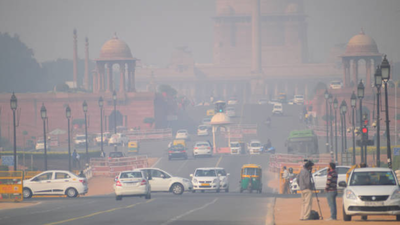Delhi’s air quality has plunged into the very poor category again, shrouding the city in thick smog and haze. Residents are facing breathing difficulties, and doctors are reporting a surge in patients with asthma attacks, bronchitis, sore throat, burning eyes, and chest congestion. While air pollution is a year-round concern in India, the spike during festive periods makes it even more dangerous for vulnerable populations. Experts warn that long-term exposure to polluted air can accelerate lung aging, increase the risk of chronic respiratory diseases, lung cancer, heart attacks, and strokes.
Who is most at risk?
According to Dr. Vivek Nangia, Vice Chairman & Head of Pulmonology at Max Super Specialty Hospital, Saket, everyone is at risk, but certain groups are highly vulnerable:
- Children under 5 and elderly over 60 years
- People with Bronchial Asthma, COPD, chronic bronchitis, or interstitial lung disease
- Those with chronic heart, liver, or kidney disease, diabetes, or other comorbidities
- Individuals with low immunity, including people with HIV, long-term steroid use, or undergoing cancer treatment
- Outdoor workers and daily commuters
Dr. Nangia explains that symptoms from high pollution include cough, cold, sore throat, burning eyes, heaviness in the head, breathlessness, and chest tightness. For those with pre-existing respiratory issues, symptoms can worsen, and upper and lower respiratory tract infections become more likely.
Preventive measures to protect your lungs
Doctors recommend the following to reduce exposure and protect your respiratory health:
- Stay indoors whenever possible; restrict outdoor movements to essential activities
- Avoid strenuous exercise outdoors, including morning walks during heavy smog
- Wear N95 or N99 masks that filter 95–99% of PM2.5 particles
- Continue prescribed medications if you have asthma or COPD, and consult your doctor for emergency drugs
- Quit smoking and get flu vaccinations
- Keep indoor air clean using air purifiers or HEPA filters; indoor plants like areca palm, peace lily, or snake plant can help
- Avoid burning incense, candles, or mosquito coils indoors
- Stay hydrated and consume antioxidant-rich foods such as fruits, vegetables, turmeric, ginger, cinnamon, and tulsi
- Practice deep breathing exercises like Pranayama, Anulom Vilom, and Kapal Bhati
Immediate home remedies
- Steam inhalation with a few drops of eucalyptus oil
- Gargling with salt water for sore throat
- Saline nasal spray to remove pollutants from airways
Dr. Pankaj Chhabra, Clinical Director of Pulmonology at Marengo Asia Hospitals Faridabad, stresses that anyone with persistent cough, wheeze, or chest tightness should consult a physician immediately. Ignoring symptoms during heavy smog can exacerbate respiratory and cardiac conditions.
